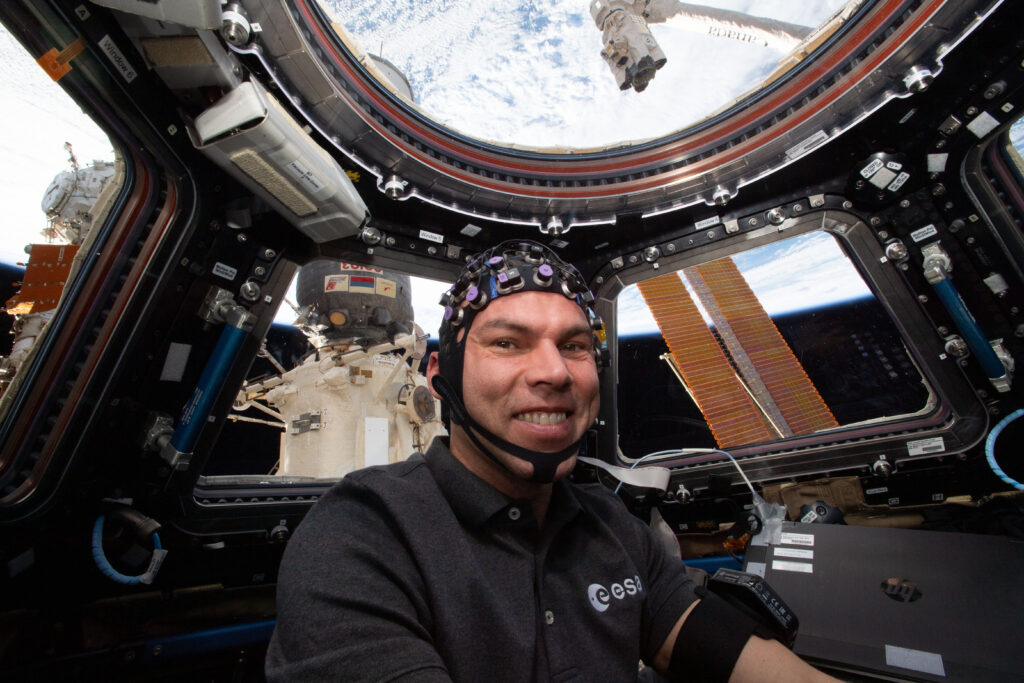What is the project about, and why is it important?
During the Axiom Space 3 mission, a research team from KTH Royal Institute of Technology, led by Michal Magkos as the project lead, developed an experiment in which astronaut Marcus Wandt used our fNIRS device to monitor brain activity. This article will serve as a description about this unique project. See more about KTH experiment using Photon Cap!
This project focuses on investigating the impact of architecture on cognitive performance and stress levels in humans, particularly in confined and isolated environments such as space station. The physical environment has long been recognized as a key factor shaping our experiences and social interactions, having a direct impact on our well-being both mentally and physically. As humanity seeks to expand its presence beyond Earth, it is imperative to understand how architecture can be adapted to enhance the cognitive abilities and mental resilience of astronauts on long-duration space missions and with diverse crew compositions.
Aim of the study
The main objective of this study is to investigate the cognitive performance and stress levels of astronauts living in space habitats. To achieve this, a comprehensive approach has been taken that integrates a variety of measurement and assessment methods.
What will be measured?
Assessment of cognitive performance: A triad of self-administered tasks – assessing working memory (WM), reaction time (RT), and executive function (EF) – will be used to identify the astronauts’ cognitive abilities. This set of tasks will be conducted in three different locations in the space habitat: private spaces that provide minimal interaction, public spaces that foster social proximity, and spaces that offer views of the external environment. These assessments will be conducted at two time points to capture differences in cognitive performance due to the sleep-wake cycle and working hours.
Sustained stress monitoring
The use of wearable sensors will facilitate the measurement of heart rate variability (HRV), enabling detailed analysis of stress levels in astronauts. HRV is measured using a two-lead electrocardiograph (ECG). The wearable sensors will allow continuous monitoring and analysis of the stress response during different activities and in different locations.
Analysis of prefrontal cortex activity
The use of functional near-infrared spectroscopy (fNIRS) sensors to measure activity in the dorsolateral prefrontal cortex (DLPFC) allows the study of a key area of the brain associated with cognitive function. These non-invasive sensors, which are attached to the head, enable to record changes in blood oxygen levels and allow analysis of cognitive load during various cognitive tasks.
Applications on the ground and in space
To maximize the value of this research, several requirements need to be met. Access to the astronauts’ schedules, including details of task locations and crew presence, is essential to properly understand the results. Environmental conditions such as temperature, humidity, noise levels, and lighting provide important data to relate cognitive and stress responses. In addition, health indicators such as blood pressure, body temperature, heart rate, and oxygen levels are essential to analyze the impact of architecture on astronaut well-being fully. The research team also aims to incorporate astronauts’ diet and physical activity data to understand how lifestyle factors interact with architectural design.
The main aim of this study is to explore the complex relationships between architecture, cognitive processes, and stress in the unique environment of space habitats. The results of this initiative will not only inform the design of future space habitats but will also contribute to the cognitive resilience of astronauts and improve their overall mental health during long-duration missions
See how Marcus Wandt prepared for his training with Photon Cap

